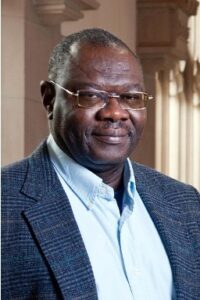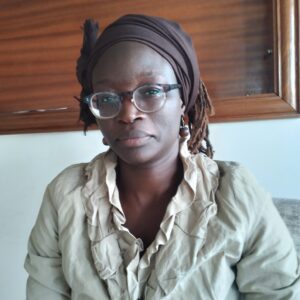On April 2, 2021, the Social Science Research Council’s (SSRC) African Peacebuilding Network (APN) held the virtual launch of the book, Researching Peacebuilding in Africa: Reflections on Fieldwork, Theory and Context, edited by Ismail Rashid and Amy Niang. Following the successful book launch, Natalie Bernstien, APN’s program assistant, interviewed both editors, posing questions about the main idea behind the book, the place of the APN, an overview of the state of research on peacebuilding in Africa, and their projections for the field in the next decade. Please note that the interview has been edited for brevity and clarity.
APN: What was the main idea behind the book on Researching Peacebuilding in Africa and how did your involvement with the SSRC’s African Peacebuilding Program influence you to turn the idea into a book project?
Ismail Rashid and Amy Niang: Dialogue, collaboration, and quality research have been at the core of APN’s commitment to help build expertise on peacebuilding scholarship in African universities. The book encapsulates and projects these core commitments. In almost a decade of existence, APN has helped facilitate the development of scholars with specializations in peace, conflict and security studies, conflict resolution and mediation, and many other areas. The APN has been able to invigorate a fertile intellectual field around peacebuilding and cognate topics. The idea of the book is to think systematically and in a collaborative manner about the key aspects of APN scholars’ work that can help articulate innovative perspectives on peacebuilding by African scholars, most of whom have been involved in field research in different parts of Africa.
Why did both of you decide to co-edit the book? How did you organize your editing tasks given that you were living in different continents?
Ismail and Amy: We decided to produce the book after much discussion of how to harness the rich pool of talents, ideas, and expertise that has been brought together in different APN meetings over the years. We knew that this would respond to the often-stated need for a book that dealt with theories, contexts, and fieldwork in Africa. We were in regular communication over Skype, Zoom, and WhatsApp over a long period. We collectively solicited contributions, and reviewed every chapter, at least twice. After reading each chapter, we would meet, and then review our individual comments before consolidating them and passing them to the different contributors. Since we read and reviewed the various chapters several times, we were able to think comprehensively about the structure and the intellectual orientation of the project. It was intensive work, and we tried to support each other during the intensive phases. An edited volume is unlike a single-authored book in the sense that its success depends largely on its editors’ capacity to harmonize uneven writing quality and mastery of background literature and sometimes reconcile divergent methodological practices.
How is this book different from your previous book projects? What was it like working with 15 other scholars to produce a book on the field of African peacebuilding?
Ismail and Amy: There were three differences from similar projects. First, it is a book that was embedded in a long scholarly dialogue that spanned several countries and different cohorts of scholars. Second, we were explicit and strategic about the composition of the contributors a keeping in mind the geographical and gender diversity, but also the disciplinary background of contributors. The latter came from quantitative and qualitative methodological practices and were trained in a diverse range of disciplinary traditions and theoretical orientations. Third, we want the work not only to be a scholarly statement but also an extension of the work of mentoring and mutual support that we have been part of within the APN. It is therefore an intergenerational, interdisciplinary, and transcontinental dialogue.
In your opinion, which factors are impacting the theory, fieldwork, and context of peacebuilding in Africa today?
Ismail and Amy: The historical and institutional conditions of the creation and development of knowledge in peacebuilding in their instability, their fragility, and their shifting character always tell us something about the uses and purpose of theory and concepts for different times. As Festus Aubyn discusses in detail in his chapter, Boutros Ghali’s landmark report, An Agenda for Peace: Preventive Diplomacy, Peacemaking and Peacekeeping, provided the impetus for reframing then prevalent approaches to conflict and conflict resolution in a post-Cold War era. In the African continent, peace research institutions emerged and accompanied the development of policy frameworks in regional bodies. Growing interest in peacebuilding research also resulted in the multiplication of outlets such as the African Security Review, the African Journal on Conflict Resolution, and the Africa Peace and Conflict Journal. One must see the second generation of peacebuilding researchers also as pioneers of a different kind. They are steeped in ongoing debates about the value and purpose of the knowledge we produce in the humanities and the social sciences. Their attention to the determinants ofconflicts is even more sharpened by the imperative to look beyond Western canons for guidance. Peacebuilding research has been tainted by the discourse on Africa in the humanities and the social sciences. Contexts of conflict were often read through the lens of aberration and abnormality. These are considerations that an emerging generation of scholars are having to factor.
Where do you see the field of African peacebuilding in the next ten years?
Ismail and Amy: It will continue to evolve, with ongoing challenges but also new opportunities. In the 21st Century, the global competition for access and control over natural resources has produced destructive wars on the African continent (the Democratic Republic of Congo (DRC); Mozambique; the Sahel, etc.). This trend is likely to intensify and to expand into regions where oil and mineral deposits have recently been discovered. Two areas of geopolitical struggle are likely to generate new types of conflicts. Firstly, the militarization of the scramble for natural resources. Secondly, and it is a related issue, the competition for control over space, both territorial and non-territorial. Both trends will be increasingly deployed at the expense of African populations, with an increasing disassociation between citizenship rights from the economic and socio-political conditions of existence of African societies concerned.
What advice do you have for upcoming researchers in the field?
Ismail and Amy: We would say go to the field armed with the principle of complexity and be ready to engage and disentangle the layers of complexity that you are going to encounter in all aspects of your work. Pay serious attention to the history and the deep causes of conflict (conflicts never spring out of nothing), contextual power relations, and the shifting configurations in the field. This can mitigate misconstructions and misreadings. Concepts and theories are vital but be critical and reflexive. As some of the chapters, for example Thomas Tieku’s and Heidi Hudson’s, demonstrate, you need to be critical of not only founding concepts and models of peacebuilding but also new-fangled ones. Be alert to the whole range of actors, conditions, complex processes – the visible and invisible factors – that shape terrains of conflict and their trajectories as well as the conditions of their resolution. Above all, take research ethics seriously.
About the Editors
Ismail Rashid, the former Chair of the advisory board of the SSRC’s African Peacebuilding Network, grew up in Freetown, Sierra Leone and has been teaching at Vassar College since 1998. He received his B.A. Hons in classics and history from the University of Ghana, M.A. in race relations from Wilfrid Laurier University, Waterloo, Canada, and a Ph.D. in African history from McGill University, Montreal, Canada. He is a professor of history at Vassar College, Poughkeepsie, New York, and his primary teaching interests are pre-colonial and modern African history, African Diaspora and Pan-Africanism, and International Relations. His research interests include subaltern resistance against colonialism, public health, and conflicts and security in contemporary Africa.

Amy Niang, a 2013 SSRC African Peacebuilding Fellow and current member of the APN’s advisory board, is an Associate Professor in international relations at Mohammed VI Polytechnic University Ben Guerir, Morocco. Prior to her current position, she taught at the University of the Witwatersrand for many years and has also held visiting positions at the University of Sao Paulo, Princeton University, the University of Halle-Wittenberg, the University of Michigan, the Institute of Peace and Security Studies (IPSS), Addis Ababa, and many other institutions. She has published extensively in the areas of state formation and related ideas of sovereignty, statehood, stateness and statelessness; Africa’s international relations; and the geopolitics of the Sahel.

About the Interviewer
Natalie Bernstien is the Program Assistant for the African Peacebuilding Network at the Social Science Research Council. Previously, she lived in Casablanca, Morocco as a Fulbright Research Scholar. As part of her research, she conducted a qualitative survey assessing contemporary perceptions of Moroccan Jewish history. Natalie graduated from the University of Texas at Austin in 2017 with a B.A. in international relations and global studies and was a part of the Arabic Flagship Program.

